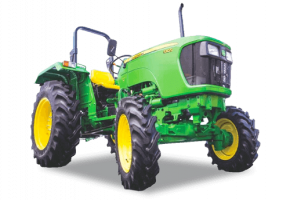Factors to Consider When Choosing a Tractor for Your Farm- KhetiGaadi

A tractor is a powerful agricultural vehicle used for various farming activities. It typically consists of a large engine, sturdy tires, and a driver's seat. Tractors are designed to provide high torque and traction, allowing them to pull heavy loads and perform tasks like plowing, tilling, seeding, harvesting, and transporting. They come in different sizes and configurations, ranging from compact tractors for small farms to large, multi-functional ones for extensive agricultural operations. Tractors can be equipped with various attachments and implements, such as plows, cultivators, seeders, mowers, and loaders, which enhance their versatility and productivity. These versatile machines have revolutionized farming practices and greatly increased efficiency in the agricultural industry.
Choosing the right tractor for your farm is a significant decision that can impact your productivity and efficiency. There are several factors to consider when making this choice. Here are some important factors to keep in mind:
Farm Size and Terrain: Assess the size of your farm and the type of terrain you have. Tractors come in various sizes and power capabilities. Smaller tractors are suitable for small farms with limited space, while larger tractors are better for larger farms with open fields. Consider the terrain as well, as hilly or uneven land may require a more powerful tractor with better traction.
Power and Horsepower (HP): Determine the power requirements based on the tasks you need to perform. Higher horsepower generally means more capability for heavy-duty work such as tilling, plowing, or hauling heavy loads. However, more power also translates to higher costs, so it's essential to strike a balance between power and your specific needs.
Attachments and Implements: Consider the type of tasks you need to accomplish on your farm. Tractors can be equipped with a variety of attachments and implements such as loaders, mowers, plows, seeders, and more. Ensure that the tractor you choose has the necessary hydraulic connections and power take-off (PTO) options to accommodate the attachments you require.
Comfort and Ergonomics: Since you'll be spending significant time operating the tractor, consider its comfort and ergonomic features. Look for features like adjustable seating, ergonomic controls, a comfortable cabin, and good visibility. Comfortable operators tend to be more productive and less fatigued.
Brand and Dealer Support: Research different tractor brands and their reputation for reliability, durability, and customer support. Choose a reputable brand with a network of dealers who can provide maintenance, repairs, and readily available spare parts. A reliable dealer network ensures that you can get assistance whenever needed.
Budget and Cost of Ownership: Determine your budget for purchasing a tractor and consider the long-term cost of ownership. Beyond the initial purchase price, factor in ongoing costs such as fuel, maintenance, insurance, and repairs. It's also worth comparing prices and financing options from different dealers to ensure you get the best deal.
Resale Value: Tractors hold their value relatively well, but some brands or models have higher resale values than others. Consider the potential resale value of the tractor you're considering, as it can impact your investment in the long run.
Visit our page for more information about Tractor, Agricultural implements, Tractor Price, Tractor Videos, and Tractor Games.
- Art
- Causes
- Crafts
- Dance
- Drinks
- Film
- Fitness
- Food
- Jogos
- Gardening
- Health
- Início
- Literature
- Music
- Networking
- Outro
- Party
- Religion
- Shopping
- Sports
- Theater
- Wellness
- IT, Cloud, Software and Technology


